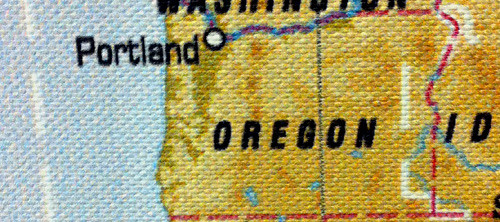 
rss feed | youtube | links | the burning log
Tuesday, December 07, 2004First rule of Fight Club: The Video Game. Don't even go near it.
A year ago, I wrote about a proposed Fight Club video game and jokingly suggested it would be in every Target store in the country by Christmas '04. Christmas '04 is here and...it's in every Target store in the country.
Or at least the Hollywood Video on Barbur. Same difference. So local cult demigod Chuck Palahniuk's first video game offshoot is, unsurprisingly, absolutely terrible. While the author has probably long since justified the decision with the aid of nihilism, post-irony and the promise of an easy paycheck, most of the blame falls on the shoulders of the design group at Vivendi Universal or the exec that no doubt forced them to rush through a title in time for the holiday season. If you were travel back through time and ask three cavemen to create a game using only a box of Crayolas and a 8 volt battery, they could come up with something better than this. A bag of ladybugs could come up with something more enjoyable. Even grass could do better. Fight Club opens with a title sequence following various characters from the novel/movie/possibly one day musical as they vandalize an office high-rise, leaving behind a flaming smiley face in the facade. It's the only glimpse the player gets at anything remotely interesting. Had the designers used Grand Theft Auto as a stylebook instead of a Mortal Combat knock-off, this might have been worth a look. Instead, past the title screen lies a poorly-developed fighting game that should have gone straight to the two dollar bin behind the five dollar bin. The premise centers around Raymond, a despondent yuppie, as he strikes out in search of Tyler Durden. Instead of playing anarchist and destroying corporate art displays, he takes on various characters from the movie like Angel Face, Bob and...various extras. The game probably deserves credit for being the first in the history of the industry to incorporate a character with testicular cancer and allowing its audience to jump kick him, not that it matters. Jump kicking cancer patients in this game is theoretical at best. Its sticky controls and vicious difficulty setting prevent any level of strategy aside from mindlessly pushing buttons in a vain attempt to land a single uppercut.
 The backgrounds are nicely detailed but its fighters look all look like bootleg Ken dolls in a .99 cent store (with the execption of Bob, who looks like an over-the-hill Ken attached to double-D manboobs). Fight Club's cut sequences consist of a series of cheap-o still frames, a far cry from the full-animations that now accompany almost all games. Aside from the logo and the Dust Brother's soundtrack, it shares little in common with its predecessors. Despite Fight Club's high difficulty level, the "story" mode can be finished in 30 minutes flat with a single combo move. With the push of a few buttons, the character can grab his opponents and break their arms as the game cuts to a grisly x-ray image of bones snapping, making all oponents as harmless as fuzzy kittens. In the game's finale, Raymond finally tracks down Durden, only to realize he's a megalomaniacal schizophrenic. After beating him to a pulp, the last cut-scene concludes like the film, with the headquarters various credit card companies falling like Jenga towers, But in an inexplicable change of heart, it's Raymond that pulls the bombs' trigger, not Durden. The only saving grace is Fred Durst, who appears as an unlockable character. As he strolls out prior to fights, his onscreen counterpart gleefully points off screen before striking a hilarious fighter's stance worthy of junior-high judo club. While Fight Club may wind in an updated edition of this, a video game that allows you to repeatedly smash the Limp Biskit singer's appendages deserves at least a little credit. Fight Club: The Video Game: 2 smashed copies of Durst's cover of "Behind Blue Eyes" out of 10.

|
